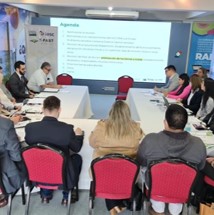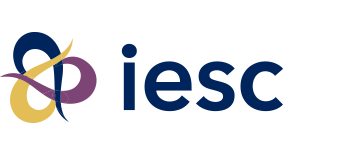Strengthening Paraguay’s NTFC
NTFC capacity building pays off as priority trade bottlenecks are identified and addressed
Established in 2017, Paraguay’s National Trade Facilitation Committee (NTFC) is organized under the Ministry of Foreign Affairs and includes representatives from the 27 public sector entities involved in the regulation and facilitation of trade, as well as representatives from the private sector. While the NTFC has made significant strides in implementing the World Trade Organization’s (WTO) Trade Facilitation Agreement (TFA) requirements in Paraguay, it required support to further enact its agenda to strengthen trade facilitation.
To maintain and strengthen country ownership and leadership of TFA implementation, IESC’s USDA-funded Trade-Facilitating Agricultural Systems and Technology (T-FAST) project has been working through Paraguay’s NTFC. On August 2, 2022, IESC’s T-FAST team identified more than 100 high priority trade bottlenecks, such as paper-based collection and retention forms and bureaucratic export payment processes, to be addressed by the NTFC.

Meeting of the newly established NTFC “DIGI VUCE” Working Group
When T-FAST was established in 2019, the NTFC convened just five times per year, the legal minimum. In 2020, the NTFC met eight times and in 2021, during T-FAST’s second year, a total of 21 times. In 2022, interest continued to grow and an additional NTFC working group, DIGI VUCE (Foreign Trade Single Window Digitalization), was created. This working group is focused on digitizing, integrating, and simplifying import and export processes and procedures to develop internal and external communication and information mechanisms that will allow it to act quickly and transparently, establishing adequate internal coordination and permanent dialogue with key foreign trade actors. In addition, the DIGIVUCE working group facilitates inter-institutional coordination by establishing mechanisms for analysis, evaluation, and monitoring of all processes that affect foreign trade, strengthening the efforts of the Single Window for Exports (VUE), and progressively integrating import and export processes with the Single Window for Imports (VUI). With the addition of DIGI VUCE, there are now four working groups determining ways to reduce bottlenecks by streamlining processes, and meeting the increasing requirements for digitalization among NTFC institutions.
The program leveraged private sector engagement and a workshop series with presidents and board members of 15 trade associations and bilateral chambers to build capacity, encourage coordination, and urge NTFC members to prioritize and address the 100+ trade bottlenecks identified in the T-FAST funded trade mapping study. This engagement is particularly important because, until 2021, the Ministry of Foreign Affairs and other public sector NTFC members had insisted that NTFC activities be limited to the specific B and C notifications of the TFA and not its broad spirit of trade facilitation.
While the TFA contains many relevant issues, it does not address politically sensitive issues that are vital to reduce times and costs for international trade. The incorporation of the priority bottlenecks adds great relevance to the NTFC, which is creating enthusiasm among both private and public sector representatives and is reflected in the increase in frequency of NTFC working group meetings.
T-FAST has successfully strengthened and empowered Paraguay’s NTFC to lead an agenda for continual improvements in trade facilitation that will have a lasting impact far beyond the life of the project. T-FAST has improved mechanisms for public–private sector engagement around trade facilitation and built capacity to communicate the broad government process and system changes that are necessary to increase the efficiency of trade flows for agricultural exports, imports, and goods in transit.
T-FAST is a USDA Food for Progress initiative in Paraguay implemented by IESC. The project aims to simplify, modernize, and harmonize agricultural trade processes in Paraguay. The project motivates and incentivizes collaboration across the Paraguayan government, the private sector, and donors to achieve maximum impact; builds the organizational and human capacity of the National Trade Facilitation Committee and institutions involved in regulating and facilitating agricultural trade; and addresses Category C Notifications of the World Trade Organization’s Trade Facilitation Agreement (TFA) while fostering a culture of continuous improvement to enable Paraguay’s overall compliance with TFA standards.


